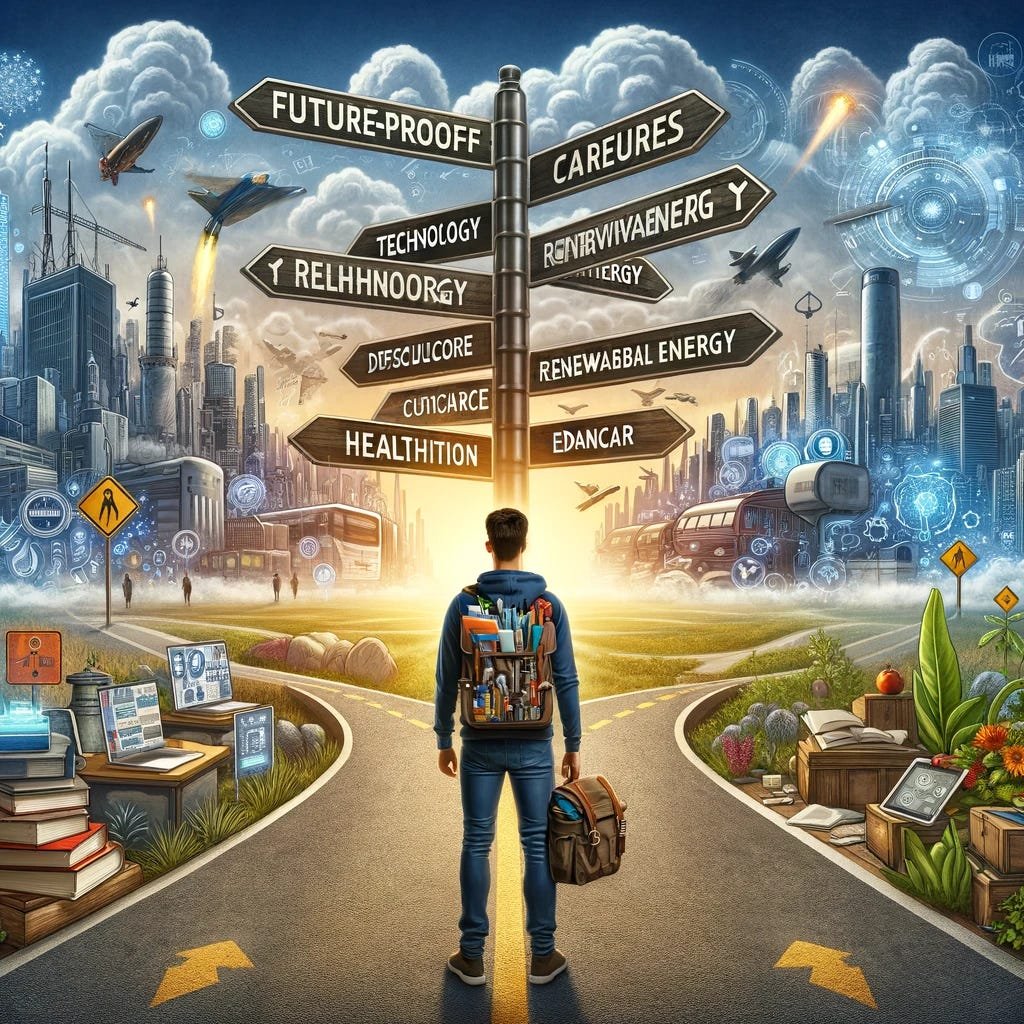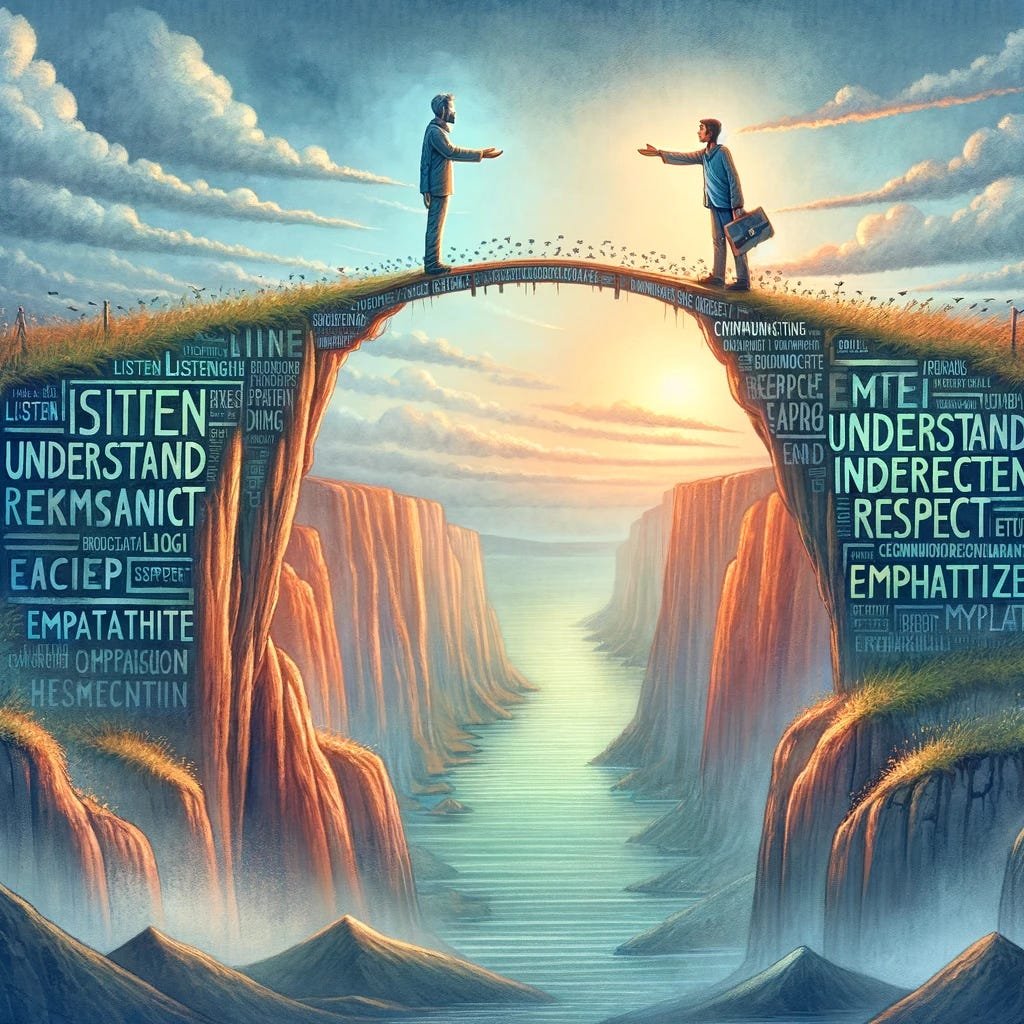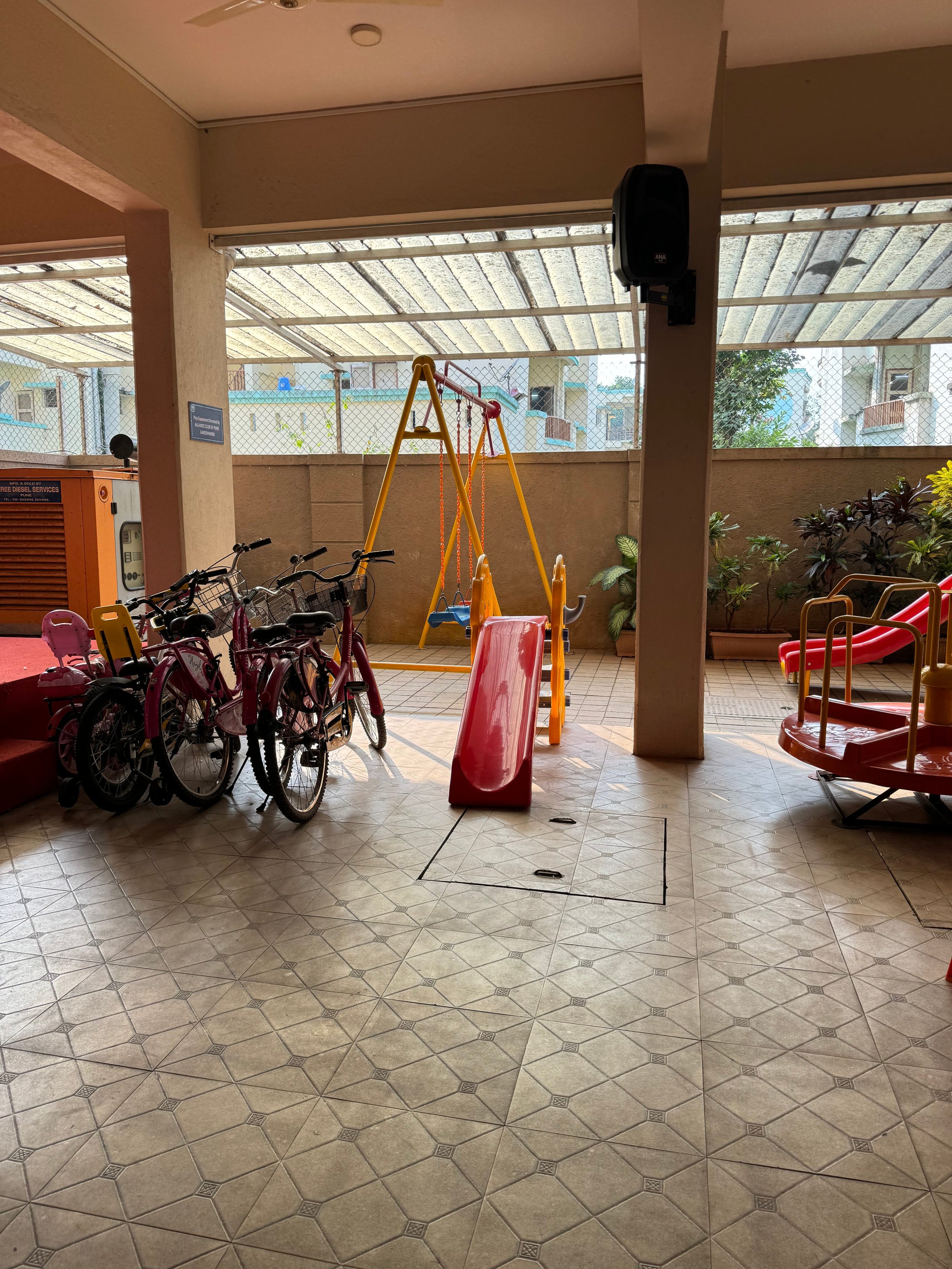Future-Proofing Ourselves
Image by GPT-4
Earlier this month:
“Meta Platforms Inc. tripled its profit and posted sharply higher revenue in the final quarter of 2023, boosted by a rebound in digital advertising as well cost cutting and layoffs in what CEO Mark Zuckerberg called the “year of efficiency.””
Meta increased revenue by over 25 percent from year ago with nearly 25% fewer employees.
In the first six weeks of this year according to layoffs.fyi 157 tech companies have laid of 39,608 employees a rate faster than anytime in the last few years.
In the much smaller media content sector the rate of job losses is the highest it has been with at least 8,000 job cuts made in the UK, the US and Canada last year, include 300 jobs lost in the collapse of news startup the Messenger; 70 at Business Insider; about 30 at Time; 115 at the Los Angeles Times; about 50 to 100 people at NBC News; and 12 at Condé Nast’s Pitchfork.
Three forces are fusing and re-sculpting employment and the workplace. 1) Technology. 2) Unbundled and Distributed work. 3) Just in time global marketplaces.
A board room that is not planning on how to leverage some combination of the exponential productivity power of AI, the ability to hire talent anywhere due to unbundled distributed work, and the availability of global marketplaces for just in time resources from talent to technology to re-imagine, re-think and re-invent their business will soon lose their board seats or control of their company.
Why would anyone run a company in 2024 the way they ran it in 2019? If one launched a firm today would it look like the firm of 2019?
As the cost of knowledge goes to zero and it becomes clear that AI is significantly under-hyped every knowledge workers job will change before the end of 2024.
The rate and impact of change of new workplaces, new markets and new tech feeding off each other will drive greater change much faster than seen in decades.
This is not the time to wish for the best, keep our head down, hope that we can retire before the tsunami hits or wait for our company or boss to help transform us.
Delegating our future to anybody else is not a good strategy.
Starting right now we must invest time and resources to hone, sculpt and architect the six key skills will be essential in the future to complement machines, co-exist with change, and ensure continuous re-invention.
Three of these have to do with individual competence (Cognition, Creativity, Curiosity) and three how we connect with each other and the world outside our minds including new AI agents. (Collaborate, Communicate, Convince).
Image by GPT-4
Cognition
Cognition is simply learning to think and keeping our mental operating system and skills constantly upgraded.
It is no longer good enough just to be up to date.
We need to be up to tomorrow.
This requires deliberate practice and sustained work. Improved cognition is achievable.
But one must work at it and many of us are so swamped with keeping up with our daily workload that we do not invest in growing our skills and expertise. This proves to eventually lead to irrelevance as the needs for yesterday’s skill sets erode and one has not replaced them with a new set of skills for the future.
If we cannot upgrade our mental operating systems we will become less relevant.
Start using and leveraging Microsoft Co-Pilot or Gemini Advanced or the Open AI set of tools. Buy the paid version since they are six months ahead of the free version and far superior. The increased productivity and time savings will be multiples of the fifty or sixty dollars a month one might spend to subscribe to multiple resources and free up the time we all claim we do not have.
Also begin thinking of operating like a Company of One by combining skills, reputation and collaboration that your existing company would want to hire or partner with.
The more you have options the longer you will stay in a company you love. Maximize career optionality to ensure long term career in one place. Read how to become a company of one.
And here is a step by step way to learn how to learn and to unlearn.
Image by GPT-4
Creativity
Creativity is connecting dots in new ways, looking beyond the obvious and this skill will be key as AI powered computers, data crunch and co-relate faster than we ever will.
To be human is to be creative.
Creativity is at its heart the way we deal with a world of change by adapting, evolving, and re-inventing.
We need to learn and feed this inside us. The future will be about data driven storytelling and not just data or storytelling and the ability to leverage modern machines and algorithms to unleash connection and meaning will depend on creativity.
This requires every one of us whether we are creative or not to start using the latest tools that will turbocharge creativity. If you wish to see what is possible spend a few minutes looking at how you can create video with text in seconds without having any coding or video or traditional creative skills here:
If you were impressed great. If not wait six weeks and it will be twice as good. That is the rate of advancement we are witnessing.
Image by GPT-4
Curiosity
Curiosity is simply being alive to possibilities, questioning the status quo and asking what if? Today the key competitor or opportunity in any category comes from outside it.
Curiosity may have killed the cat, but the lack of curiosity killed the careers of many people. When boundaries between industries shift and our minds are like champagne corks swelling and no longer fitting into the past the key is not to accept but question the status quo.
AI co-relates and connect dots and look back but rarely anticipates forward and what is next. Humans ask why? As well as why not?
By constantly upgrading our cognition, expressing our creativity and feeding our curiosity we seize tomorrow versus fearing tomorrow.
The 3C’s of Connecting
Being cognitively up to date, creative, and curious will not be enough since we are living in a connected world where eco-systems, teams and linkages are how ideas are born, value created, and long-term careers forged. For these we need to hone and build and train for three other skills which are collaboration, communication and convincing.
The parts of our job that are built around collecting and arranging information and data, or monitoring, allocating and distilling is rapidly going to be done either by machines or someone in a market far away but the ability to work with people, write and present and be a world class sales person taking the data and new resources to build new stories will remain relevant.
The machines and the markets will not be the differentiator it is how we work with them, present and convince others will.
Image by GPT-4
Collaboration
Collaboration is key to work in a world where API’s (Application Protocol Interfaces) are not just about handshakes between software/hardware but between individuals with different skills, teams in different countries, partners, suppliers and much more.
As the world re-imagines and re-configures itself we need to be like Lego pieces and learn to fit and connect and combine with others to transform ourselves and our companies.
Collaboration with others and machines which we will learn to complement is a way to ensure that EQ and HI (Human Inspiration) will add value to the IQ and AI of digital agents and algorithms.
Image by GPT-4
Communication
Get better at writing. Enhance presentation and speaking skills.
It may be so old school but watch the people who succeed, and they are good at communication.
Combine the roots of old traditions of writing and speaking and human engagement with the new methods of AI and cloud marketplaces.
Learn to provide points of view not just data, provocation versus the both sides information dump that AI is engineered for, perspectives that combine past and future and math and magic.
Great communication skills will be the differentiator versus chat bots and virtual presences.
But communication is not a one-way street and as important as it to write, speak and present it is as critical to be able to listen, to hear and to understand what others are saying with an open mind and a sense of empathy.
Empathy and looking for the unsaid and unexpressed is what the machines cannot do.
Image by GPT-4
Convincing.
Every one of us is a salesperson regardless of what we believe our title is. This is true even if we do not sell anything at work. We must convince colleagues of our points of view.
We all must learn to convince and learn to sell.
Humans choose with their hearts and use numbers to justify what we do.
Humans are stories. Stories are data with a soul.
Convincing is often a soup of facts and stories.
By investing and combining the Six C’s ( Cognition, Curiosity, Creativity, Collaboration, Communication, Convincing) each of us can thrive in the new future and help our companies and customers grow.
These skills will never grow old or out of date and will ensure that we can embrace the future, adapt ourselves and organizations to whatever comes and complement others and machines in ways that are synergistic
Images by GPT-4
Ghar.
Earlier this week I spent some time at an extra-ordinary place in the city of Pune, India which is about 100 miles from Bombay ( Mumbai).
It is called Ghar which in Hindi means house or home.
It is a seven floor building in an area surrounded by various Indian Army facilities and it serves three purposes which enforce each other
An Orphanage: It provides shelter, food, education and love for 40 orphan girls.
A place for Disabled Women: 9 partially paralyzed women are provided housing and rehab.
An elder age home: 19 retired people are provided a place to live.
This way three generations live in one home with the orphans surrounded not just by teachers and administrators but a true family. They have “grand parents” and provide help and comfort to the disabled women who would be their mothers age while the elderly have ready made “grand children” and the voice and commotion of the young.
I spent some time with Colonel Mickie Uberoi who along with a few other retired officers of the Indian Army pooled their resources and raised funds to create this amazing space. The six minute video below is very much worth a watch:
A Culture of Excellence with a Growth Mindset.
The army officers wanted to ensure that the orphans were raised in a culture of excellence.
They just did not want the orphans to have a place to live but a way to boost them for their entire life with a combination of education, mentoring, getting used to a good quality of living and exposure to the very best experiences available in Pune.
Each one of the girls are told that their goal should be to have an impact on society and find ways to help others.
It begins with early education in the orphanage imparted by great teachers and then placement in the best schools including army schools that the match the ability of each girl. Each girl is encouraged and supported to be world class. When they return from school further tuition is provided in the evenings to ensure the girls do not fall behind.
Tennis table training and basketball and other sports are also made available and the girls are often invited by surrounding institutions to see parades, shows and as many activities to expand their horizons.
The quest for excellence can be seen in the space which while filled with the sound of laughter and learning is intensely clean with a gym, a meditation room, a garden and a rooftop terrace.
To ensure a sense of self and not subservience but respect they are asked to refer to their elders as aunty or uncle but not “sir” or “madam”.
Freedom within a Framework.
When we saw the youngest girls we first thought they were boys (see above) but were corrected.
The administrators have discovered that some of the girls with long hair had issues with lice so everyone has a short haircut till they get a little older. This way no one feels different but they can also look at the older girls with longer hair and know the hair they have lost is coming back.
When they are in the orphanage they all have a uniform of jeans and long sleeve shirts but each girl also gets to select their own wardrobe for special events and for when they leave the facilities to go to events or outings.
Each girl decides what she would like to study and what sport she would like to play and then they are provided with a disciplined course to achieve their goals.
It is a wonderful way to have a process and rules for everybody but then many things are personalized for each person.
A Canvas for Generosity.
Ghar has become a canvas for people in Pune to paint with their generosity.
The joy that comes from giving and helping others is enabled by the scaffolding of volunteer opportunities that it provides.
Services: Doctors and Dentists are not just available on call for the residents of Ghar but many have fixed hours where they come in every week or month and staff the medical rooms.
Materials: The picture above shows a small section of the indoor but airy playground. Different individuals give and maintain their gifts whether it be bicycles, slides or basketballs.
Experiences: Tickets to events or invitations to things like parades or fireworks are provided for some or all of the inhabitants to they are exposed to a wide range of experiences ( and get to wear their going out clothes).
The fact that every one can help in their own limited way from spending an hour providing free medical care or funding a basketball ensures that limited time or resources should not stand in the way of people who might want to help.
Future Forward Thinking
The retired Army trustees believe that the orphans they are housing today will be the ones to keep Ghar running after they have aged out or passed away.
The belief is that as the girls graduate and go out into the world this place will still be their home since it where they grew up. It will not just be their roots where they will re-connect with others they grew up with but the hope is that they will fund, run and maintain it for the next generation of orphans.
Everyone is reminded that this is not a home they are staying in but it is their home that they have to keep going because helping a single person makes a big difference.
Or as the Ghar slogan reminds us:
“Helping one person may not change the whole world, but it can change one person’s whole world”
Remaining Relevant.
The issue everywhere.
The one that lingers in the air.
After the pretenses are stripped bare.
That every manager and business share:
Is how does my business remain relevant?
Are our business models up to snuff?
Do our partners and suppliers have the right stuff?
Will the business hold when things get rough?
Why is managing talent so tough?
How do we as leaders remain relevant?
How will AI change my job?
What challenges will it lob?
Will it of my livelihood rob?
The pace of change why does it makes me sob?
How do I in an AI age remain relevant?
The answers are slowly starting to emerge.
This is not the time to sing a dirge.
Instead towards this new world we must surge.
And some old ways of thinking we need to purge.
Maybe re-inventing, re-learning, re-thinking are the ways to remain relevant?
It is a time to invest big and dare.
A time to realize that AI while key will be a commodity and not rare.
AI while essential unlikely to differentiate from competition when buyers compare.
Rather how does one optimize the AI and HI (Human Inspiration) pair?
Maybe embracing tech alone may not be enough to remain relevant?
Embracing the tech is a key.
It is however but the entry fee.
The difficulty is how to adapt our current ships to sail in this new sea.
How to ensure the machine complements and does not replace me.
From the noisy confusion we must find fusion to remain relevant!
What is important is that every one of us must seize the day.
Take the time and even invest to learn from part of our pay.
Do not only depend only on the employer to equip you for the future way.
The more up to tomorrow you are the more in your job you will be able to stay.
Do not delegate the task to others of you remaining relevant!
The age of de-bossification is on the way.
Do not just manage, monitor, delegate or measure your talent will say.
They ask what have you created, built, made or who have you mentored today?
Inspire and help them grow and only then they will stay.
Adapt and grow as a leader is the way to remaining relevant.
The future despite the screeching headlines is bright.
Seize the day and all will be right.
To twist and transform ourselves into new shapes is the fight.
From the dark we will emerge into the light.
Only when we transform do we and our company remain relevant.
Driving Changes; 8 Learnings.
1. Change Sucks: While many folks’ prattle on how "change is good" and should be embraced, the reality is that change means doing new and different things and trading in the comfortable, the tried and true and what one knows for months or years of stumbling, inventing things on the fly and looking quite incompetent. Let’s be honest with folks who we would like to help change and acknowledge that it is difficult.But while change does suck, irrelevance is even worse.
2. People are analog: As much as the world is going digital, people remain analog. We have emotion and we make decisions that are not entirely rational. We care about how we are perceived; we love our turf, and we fear uncertainty. Unless one can understand the human needs and concerns when one is looking to deliver change it can get very difficult.
3. Incentives are critical: As Stephen Levy the author of Freakonomics makes clear, to understand someone’s behavior it is critical to understand their incentives. We behave like we are paid to behave. So, whenever anybody wants a key to to drive change, they should start with changing incentives. So many industries continue to reward and provide incentives for the status quo while churning out press releases about change. Change only happens if it makes economic and career sense.
4. Fear must be reduced. Because change is associated with fresh and new things it is also associated with a higher degree of failure. Cultures that penalize failure find themselves ossified to the past. The big difference between Silicon Valley and Japan is their perspectives on failure. In Silicon Valley failure is a badge worn proudly while in Japan it often leads to suicide due to loss of face. There are no second chances in Japan and multiple chances in Silicon Valley. If a company had a high fear level (do people whisper? are folks afraid of the boss?) than the change I recommend to folks is to quit and find a better place.
5. Culture must be paid attention to. Every company has its culture. Some are strong and some weak but often successful companies have very strong cultures. This culture has often been the reason for the company’s success but sometimes may be its weakness in the future. Changing or attacking a company's culture is very intricate and requires both the patience and the precision of a surgeon. Eliminating some key parts of a Company's culture without understanding its importance or role it serves can not only be detrimental to change but also cause the change agent to be tossed out. The best change agents are experts at understanding company cultures.
6. Tell all the Truth but tell it Slant. This advice is from the poet Emily Dickinson. She goes on to say, " the truth must dazzle gradually, or every man be blind...". Full frontal attacks, hysterical statements about "dead business models" and other melodrama may make good blog copy or conference panel grist but rarely is effective in getting large successful firms to navigate change. The facts must be stated without personal attacks or offering choices that must be made at gunpoint or under fear. Let the facts speak for themselves. Let the reality dawn and rise versus going from darkness to high noon.
7. Bring Data, Facts and Examples. Once a company gets emotionally ready to change, it still needs a lot of facts and examples and here one must be ready to interrogate the company's legacy metrics of success. For instance, most content companies are under the mistaken belief that their content is valuable and can be monetized when the truth is that access to content and new ways of monetizing content is really the future. Data and examples that illustrate this gets the attention of the money folks and the strategic leadership of a firm whose support is key to drive change.
8. Inspirational Leadership is key: At some stage the numbers can be supportive, fear can be reduced, people’s incentives aligned, and the cultural issues addressed but that alone is not enough. At some stage there is a jump into a void that must take place. It is here that the leadership of a company must stand up and inspire. People follow people and not power point.
Davos 2024 = Davos 2017?
Here are my key takeaways from Davos…
The key themes were AI, China showing up in force and worries about it, the breakdown of trust, the need for business transformation, an increasingly polarized world with rising nationalism. These topics and concerns overwhelmed the more recent disruptions caused by the Russian/Ukraine and Middle-East troubles.
If you have been reading summaries of Davos 2024 that just concluded , you probably are familiar with these points.
But here is the zinger…my write-up below was written 7 years ago which was the second last time I was there in person! (Here is the link to the original post.)
This suggests that a) real trends are long lasting , b) change happens much more slowly than the headlines suggest since it takes time for organizations and people to transform and c) all of us should focus more on the signal than be distracted by the noise.
The key drivers remain the same and every one of us should align ourselves and our firms with these underlying challenges and opportunities.
The 2017 Write-Up from Davos.
Over four days there are over 400 sessions on the official World Economic Forum Annual Summit program. In addition, there are a multitude of breakfasts, lunches and dinners with speakers and panels. And then the myriad conversations one shares with some of the 3000 plus delegates. No person can truly summarize the event since one only gets to experience a sliver of what is possible.
Keeping this reality in mind, here are some of the key themes and takeaways from my perspective.
1. Middle Class Driven Populism is and will be the driving force in Western Politics: A combination of a) liberal governments who moved money to the less well to do b) de-regulation and weakening of unions which drove money to owners of capital and c) globalization which moved opportunities to Asian and Southern hemispheres all coming at the time of minuscule economic growth has left the Middle Class in most nations in the West wondering who is on their side? According to the Edelman Trust barometer 53% of people globally do not believe the system is working for them.
Globalization overall has been dramatically good for the world, helping lift a billion people out of poverty, reducing prices, and bringing new opportunities. This is true overall, but for individuals who do not have the right skills or find their job outsourced this is a calamity. As a result, huge swaths of the voting public in the US, UK, France, and other countries are voting against globalization and for national interests first.
The World Economic Forum’s goal is to “improve the state of the world” but individuals do not live in the broad world but in a particular area or country and many things that improve the overall world, hurt countries and localities and it is this oversight that has made people question globalization and the supposedly stateless “Davos Man.”
For the next few years, we can anticipate at best a modified form of globalization where the impact on the middle class and local economies will be the first filter that both politicians and business leaders will be forced to contend with. Donald Trump’s “America First” mantra will be repeated in many other places where elections are held as the middle-class revolt against what they believe is a system rigged against them.
2. Artificial Intelligence (Cognitive Computing) has arrived and will add to the disruption and create a huge need for skill training:
The concept of AI has been around for over 50 years, but it is only now with the advent of deep learning made possible by huge amounts of data, cloud based computing and low-cost storage that pattern, image and voice recognition has reached a point where their capability is growing exponentially.
If you use Google Translate you will find that in the last few months, it has advanced more than it did since it was launched years ago due to AI. From Amazon Echo to Watson Cognitive Computing, AI is the new frontier of technology, and it will drive a huge increase in automation which will impact jobs as much as off shoring did.
This reality caused every AI conversation in Davos to constantly focus on the impact on jobs. IBM’s CEO recently published an internal manifesto on AI which focused on terms such as purpose and transparency and noted her belief that IBM wants to augment versus replace jobs. For instance, IBM Watson today which has been trained on 18 million documents helps doctors make better decisions for Cancer patients because only a machine can imbibe the 8000 new papers being published daily in Oncology.
Major questions arise on AI, where the machine learns on data, as to who trained the machine and what data was used. Just like you and I come out differently depending on what our experiences have been an AI machine will reason differently depending on how it was trained!
Can an AI machine make a blue-collar worker now do white collar work by helping them up-skill? Or will they lose their jobs? Will an AI trained person be a “new collar” worker? Long before driverless cars, it is these reasoning/seeing/speaking computers that all of us will have to be contended with.
Therefore, even after attempting to keeping the immigrants out and putting up barriers to trade, we will find that computing progress will challenge employment and will require a major investment in skill development to keep people working. Education will be critical but a new type of hands-on skill versus four-year college will be required.
3. As the world gets increasingly connected, we are also sometimes getting more disconnected: Today over 3 billion people relate to over 1.5 billion people on Facebook alone. But oddly a combination of people seeking out people like themselves, algorithms that maximize engagement by showing us things we agree with has left us disconnected from ideas, individuals and initiatives that do not “fit” our lives. Thus, we float in our little bubbles, warm in our soapy self-loving embrace, while occasionally flaming and pricking other bubbles that float by which are not aligned with our way of thinking.
This lack of connection and trust was seen in Edelman’s Trust Barometer where trust levels for business, leaders and the media were at all-time lows. People now look to friends and family and people like themselves for news, opinion and expertise. We can make fun of some of our “post-truth” politicians but if we spend our time in our own self-reinforcing chambers are we not also “post-fact” or “post-truth”?
And it is here where I found the folks at Davos were behaving with trepidation and uncertainty. For instance, given the huge concentration of wealth or revenue in a sliver of companies and people (10 percent of the companies drive 80 percent of profits, 8 people have the same wealth as the bottom 3.5 billion, and technology is actually making more wealth go to fewer people with in many tech industries one company taking it all) there was very little real discussion on any painful steps that would be needed to be taken to ensure that those left behind and angry do not explode. No talk of new regulations or laws. No talk of taxes. No talk of re-distribution. Apparently providing training (with no details of even how this was to be done) and some light self-regulation will be enough.
The reason that at Davos there was uncertainty because the folks know that society is changing in ways where an unmitigated quest of globalization, improving the state of the world at the expense of the state of a country and pursuing stockholder return/wealth creation alone, no longer resonates or will be accepted.
It is the reason many companies are leading with the “Responsible and Responsive” focus ensuring that in addition to CSR activities they truly help people’s lives get better. The soft edges of a companies will become competitive edges.
4. China Rises: For the first time at Davos the President of China participated. In a 30-minute talk President Xi built a case for globalization and for being protective of the environment. Without mentioning the US or Donald Trump he worked to show that China was ready to take the mantle of world leader due to its openness and solidity.
In many other panels various Chinese leaders from Jack Ma of Alibaba and more spoke of how they would be enabling jobs, importing goods as they moved to a consumer driven society, focus on soft power through entertainment and much more. There is a clear belief and feeling among the Chinese that this is now their time as EU grapples with its self-identity and Brexit and the US figures out Trump. Disengaging from the world currently is not really an option.
While there are lots of challenges that China itself grapples with from its heated leveraged real estate market, environmental issues, capital/talent flight and the role of the Communist Party, it feels stronger than ever before because maybe the West seems more confused than ever before.
5.Companies are going to have to change their behavior and their structure: Companies are struggling to integrate the short-term reality of markets looking for results and the need to invest for the long term to remain relevant and re-invent themselves. Most CEOs are smart enough to know that they have to find a balance between these two extremes but worry that they are more biased towards the short and rather the long term and therefore are likely seeding their own self-disruption. The markets almost seem to look at established firms as cash cows that they need to milk while moving their grass (green dollars) to newer firms that have been designed for the mobile connected world.
Bain Consulting put out a study noting that in an age of Amazon Web Services and other platforms companies will quickly have to decide are they platform companies? Outsourcings specialists? Product companies? or Service companies? Being all things to all people will no longer work. Focus on one and connect to the others to deliver the solution.
Bain Consulting also re-iterated something everybody in business knows which is that the next generation of talent is not looking to climb a hierarchy but are looking for purpose, impact, experience, and skills and do not want to be managed but inspired.
Finally, speed is a competitive advantage and therefore companies are going to have to be decisive with the yes and no and then decentralized with empowered teams to make things happen.
Organizations and leaders need to re-imagine themselves in this connected age.
Net, we need to go from being controlling, centralized, short term-oriented managers to empowering, federated, long term inspirers.
6. Trust: If there is one overall theme from this Davos it is trust. How to get it? How to keep it? How to regain it?
There has been a breakdown in trust with all four institutions (Government, Business, NGO and the Media) seeing simultaneous declines according to Edelman tracking
Can our politicians be trusted to look after the people who vote for them, or will they look after the people who pay for their campaigns? Will our business leaders think beyond short term profits and global domination and think of the communities they work in and invest in keeping their people relevant and make long term decisions? Can the platforms like Facebook that run black box algorithms and refuse to share their data be trusted with the news and connections and results they show us? Can we really believe that Artificial Intelligence will not come to replace us and the IBM, Amazon, Microsoft, Tencent, Alibaba, Google, Apple and Uber that are driving our future in this area can be trusted with this?
This Davos was clearly one filled with uncertainty and change more than ever before. The themes that I took away (again one person’s perspective based on what I was exposed to) may make one feel pessimistic but we need to keep in mind that the World is better off today than ever before but many people have been left behind and we need to re-think the coming age with inspirational thought, deep feeling and generous sharing of perspectives and the views of different groups as we build an even better future.
7. Implications for Business and Marketing: If there is one theme that business and marketers should focus on is how to be seen as a trusted brand or company. In todays connected world being authentic, purpose driven and transparent is key to gain trust not only among purchasers but also current and potential employees. Thus, companies need to have significant programs externally to ensure they are helping communities, that they are careful about where they source from, that they look at things beyond the bottom line and their Brands are aligned with the greater good. In addition, as employees become the key ambassadors for Brands and the talent wars heat up it will be key to constantly communicate, train, and connect with employees making plans and senior management accessible.
The AI world will impact marketing in a big way. We already saw at CES that Amazon’s Alexa voice operating system was being incorporated into many products and services from Refrigerators to cars. Voice based search will change the way we manage search. And importantly AI bots will augment CRM. These are all scalable today and AI will be a key platform for marketing. At the same time the augmented capability of AI to up-skill and do things faster than humans will require companies to both up-skill their own people and to consider what jobs should be primarily done by machines. The economic competition and price pressures all companies face will not disappear, and AI is one way to increase productivity.
Finally, given the emphasis on data, business really needs to interrogate whether their data programs are as valid and relevant as they can be. Can a company’s data be a bubble of delusion as they frame things through their brand or their category versus what people want and feel in an age of AI are they truly utilizing the correct co-relations and algorithms. Most importantly we often choose with our hearts and then use numbers to justify what we just did. In such a world marketer should never forget the emotion and the feeling that makes us human which often overrides logic and rationale.


















